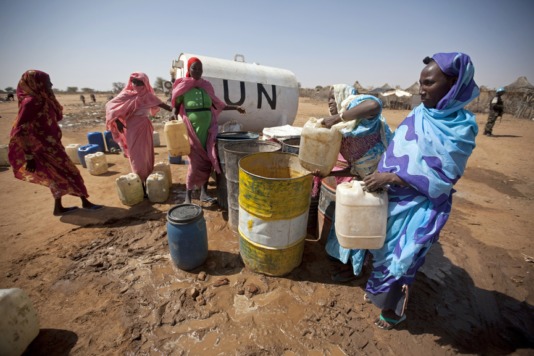- About
- Topics
- Picks
- Audio
- Story
- In-Depth
- Opinion
- News
- Donate
-
Signup for our newsletterOur Editors' Best Picks.Send
Read, Debate: Engage.
| April 07, 2013 | |
|---|---|
| tags: | #Africa, #African Union, #AID, #Dafur, #development, #South Sudan, #Sudan, #UN |
| located: | South Sudan, Sudan |
| by: | FairPlanet Editorial Team |
This weekend, delegates from donor countries and financial institutions will be meeting in Doha, Qatar, and are expected to pledge support for an ambitious development strategy in Darfur. And yet, why are so many Darfuris, and Darfur activists, still so uneasy?
The Continuing Struggle
With a few exceptions, the authorities shield members of government forces from prosecution and have ignored International Criminal Court warrants for the arrest of President Omar al-Bashir.
Under these circumstances, it is difficult to see how the 155-page Developing Darfur: A Recovery and Reconstruction Strategy – which advocates for a $7 billion infrastructure development project to include the building of new roads, schools, clinics, and agricultural schemes - can ever be meaningfully implemented. As the World Bank itself has noted, countries mired in violence are where people face the worst failures of development. The World Bank's 2011 World Development Report notes how crucial security, justice, and jobs are to break the cycles of violence.
Moving Forward: How to Develop Darfur?
The aims of the conference are admirable. In addition to supporting recovery and development projects, it will draw attention to a region that has slipped out of the limelight of late, and may act as a catalyst in ongoing negotiations surrounding the Doha Document for Peace in Darfur. However, long-suffering Darfuris deserve international solidarity and generosity, but there are real concerns that funds will not improve human rights.
Money can’t buy the reforms needed to make the strategy’s vision of respect for human rights and the rule of law materialise. Only Sudan’s government can rein in its forces, disarm militia, hold abusers accountable.
All of those steps are set out in countless UN Security Council Resolutions and incorporated into benchmarks such as those put forward by the UN Group of Experts for improving the human rights situation. But Sudan has continually repudiated external efforts to change its behaviour and implemented almost none of them.
International donors rightly want to see sustained development and respect for basic rights in Darfur. They should not accept partial, politicised development, nor should they ignore ongoing rights abuses or the pressing humanitarian needs that still exist. Instead, donors should lean hard on their beneficiary government and insist on long-demanded reforms and better human rights conditions. They should insist on full access to Darfur, transparency in the management and oversight of the funding, and independent monitoring to ensure that funds promote real improvements in the human rights situation and don’t contribute to continuing repression.
A form of this article was originally published by Think Africa Press.
To sign Fairplanet’s petition calling on the Sudanese government to end violence in South Kordofan click here…

By copying the embed code below, you agree to adhere to our republishing guidelines.
